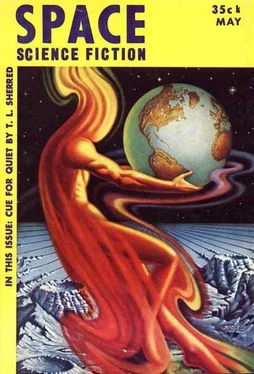Thomas Sherred - Cue for Quiet
Здесь есть возможность читать онлайн «Thomas Sherred - Cue for Quiet» весь текст электронной книги совершенно бесплатно (целиком полную версию без сокращений). В некоторых случаях можно слушать аудио, скачать через торрент в формате fb2 и присутствует краткое содержание. Год выпуска: 1953, Издательство: Space Science Fiction, Жанр: Фантастика и фэнтези, на английском языке. Описание произведения, (предисловие) а так же отзывы посетителей доступны на портале библиотеки ЛибКат.
- Название:Cue for Quiet
- Автор:
- Издательство:Space Science Fiction
- Жанр:
- Год:1953
- ISBN:нет данных
- Рейтинг книги:5 / 5. Голосов: 1
-
Избранное:Добавить в избранное
- Отзывы:
-
Ваша оценка:
- 100
- 1
- 2
- 3
- 4
- 5
Cue for Quiet: краткое содержание, описание и аннотация
Предлагаем к чтению аннотацию, описание, краткое содержание или предисловие (зависит от того, что написал сам автор книги «Cue for Quiet»). Если вы не нашли необходимую информацию о книге — напишите в комментариях, мы постараемся отыскать её.
Cue for Quiet — читать онлайн бесплатно полную книгу (весь текст) целиком
Ниже представлен текст книги, разбитый по страницам. Система сохранения места последней прочитанной страницы, позволяет с удобством читать онлайн бесплатно книгу «Cue for Quiet», без необходимости каждый раз заново искать на чём Вы остановились. Поставьте закладку, и сможете в любой момент перейти на страницу, на которой закончили чтение.
Интервал:
Закладка:
"Remember this, Senator. Remember this one thing; if I ever see, if I ever hear as much as one word from you about war or bombs, in private or public, you'll live just long enough for me to hear about it!"
I threw a disgusted glance at the rest of the table. "One thing you don't know, Senator, is that I can kill you where you sit. Smith!"
The Old Man was astonished as the Senator, who sat with gaping piscine mouth and pop eyes. "Yes, Peter?"
"Tell him," I snapped. "Tell him how Kellner found out that I can stop a heart just as fast as I can a truck. And you'd better tell him while you're at it that Kellner thinks I'm emotionally unstable, subject to fits of temper. Tell that to the Senator. Tell him what Kellner said about me."
Smith coughed. "I think you all agree that Mr. Miller is a trifle upset. You can form your own opinion as to his temper. As to the other … well, Dr. Kellner is the top man in his field. He tested Peter-Mr. Miller-very thoroughly. I would give very careful consideration to whatever he says about Peter's capabilities."
Now you can see what makes a diplomat. When Smith was finished talking it sounded as though Kellner had actually said that I could murder someone. And yet Smith hadn't told even a tiny bit of a lie. Lying, as any married man knows, is knowing what to say and what not to say at the right time. But to get back to the rest. I dismissed Suggs. I ignored him for all the rest of the time he was there. Even when I looked directly at him, and that hurt him. I have hopes, high hopes, that might have brought on the real heart attack he had the next day.
"So," I said generally to the rest of the table, "let's just assume from now on that you're dealing with a homicidal maniac with unlimited power. Is that the phrase you were thinking of, General?"
General Legree jumped as though he had seen me pull the pin on a live grenade.
"Forget it, General," I told him kindly. "I just read a lot of your speeches. Now you, Mr. Morgan, you're apparently having a meeting. I got here a little late. How about telling me the score?"
The tension seemed to seep out of the room as tangible as a stream of water. Suggs shrank up in his chair like a little old kobold, the Generals shifted into easier positions with the old familiar creak of expensive leather, and the man Smith looked right at me with his right eye closed. I'd said what he wanted me to say, but now what? Where did we go from here?
Undersecretary of State Theodore Morgan was one of the career men to be found in State Departments throughout the world, if by that you mean someone who has had the same job for years. The newspapers liked to tee off on him occasionally, using his pseudo-British mannerisms and habits for caricature. And the great American public, I suppose, considered him pretty much as a jerk, as the public is most apt to do when regarding a man who wore striped pants and a top hat in public and apparently liked it. But the Old Man, Smith-and I never did find out if Morgan was Smith's boss or vice versa-set me straight on a lot of things about Morgan. He had a fairly rough job, as jobs are when you do something you dislike merely because policy has been set by higherups. Let's just say he did the best he could, and let it go at that.
He was in charge of the meeting, all right. He knew just how to handle Simon Legree, and without Suggs things went fairly smooth-on the surface.
"Mr. Miller," he said, "you made a rather abrupt entrance into the conversation. I think it better if we have it understood right now that we prefer to use reason instead of volume."
–
"Call me Pete," I said. I knew, somehow that he hadn't disapproved too much of what I'd said, and he was cracking down at the outset just to show the rest that he wasn't intimidated. "Pete is all right with me, since I'm sure that this is all among friends." I looked around, and they were all friends. Especially the two generals that had seen me stop the trucks from the Federal Building window. I don't say they were actually afraid; just cautious. Just friends.
I went on. "Maybe I can help break the ice. I suppose you were talking about what you were going to do about things in general, and in particular, me. Well, go ahead."
So they did.
I won't bother with the details of the rest of the meeting or conference, or whatever you want to call it, because I don't think the details are too important. For one thing, when the first flush wore off, and I began to realize the colossal bluff I'd gotten away with, I got a little weak in the knees. For another, Morgan and Smith did all the talking to amount to anything. Legree, who seemed to be the self-appointed spokesman for the Army, really didn't have much to say when he knew that the State Department had all the cards, with me the joker. The Navy played right along when it was tentatively agreed that it was to be an island where I would be "stationed," as they euphemistically called it; they knew that islands are surrounded by water, and who sails on the water? The FBI got in their little piece when they were made responsible for general security. My contribution was that I was to be responsible to State, in the person of Smith, and Smith was to be the boss as far as conditions were concerned. When I brought that up I knew the Old Man was thinking of all the times I'd complained about his guardianship, and wrote him a tiny note so he wouldn't get too pleased with himself.
"The lesser-or the least-of many evils. Don't get swell-headed." He just grinned when he read it, and stuck it in his pocket to save for Morgan, I feel sure.
Smith and Bob Stein and I were the last to leave, and Morgan's grip for an old man was firm as we shook hands. "You did an excellent demolition job on the Senator," he said. "You know, Pete, there is one of the few people that have made me regret the job I have."
"Forget it," I told him. "You can get fired. Me, I got seniority in a lifetime job. As far as that carp is concerned, you can consider me your chief steward. I'll run ten miles to take up your grievance with Suggs."
Morgan smiled politely as he ushered us to the door, but I don't think he knew what I meant. They don't have unions in State.
The island isn't too bad. I swore, years ago, with the first cold I ever remember having, that I would never care if I ever saw snow again. And where I am, there isn't any snow. The beach is yellow as gold, the sun comes up every day in the east and sets in the west, and I've got for my personal use the biggest, shiniest bar you ever saw in all your life. They ship in draft beer for me all the way from La Crosse, Wisconsin, and Munich, Germany. Every month I get a four-quart keg from Belfast in Ireland, and I've got all the gadgets I need to mix anything a barkeep could dream up. The ice I get from what probably is a six-hundred dollar refrigerator that makes nothing but ice cubes. I have a subscription to practically every magazine I ever heard of, and I get daily aerial delivery-that's right. A little Piper Cub with floats drops the New York Times , the Monitor , and a couple of others every morning-of the newspapers with the least amount of junk. I used to get the Detroit papers, but I found out it took too much mental effort to avoid looking at the Vital Statistics, where they record the marriages and deaths.
I finally learned to play bridge. Euchre doesn't seem the same without a barful of people, and pinochle is not the game that Stein is good at. Bob Stein, the poor guy-although he never says one word about it-takes everything in his stride. He spends six weeks out of every eight here with me and the others that form the crew of this little island afloat in the Southern Sea. The food is good, and with no limit to variety and type. We can't be too far from somewhere, because every once in a while we hear a rattle and banging somewhere out to sea. Once we heard what sounded like a full scale battle. I pried it out of Bob Stein that it was just maneuvers, as he called it. I know better. I see nothing but naval craft, and I suspect that they're not always just at the horizon for practice.
Читать дальшеИнтервал:
Закладка:
Похожие книги на «Cue for Quiet»
Представляем Вашему вниманию похожие книги на «Cue for Quiet» списком для выбора. Мы отобрали схожую по названию и смыслу литературу в надежде предоставить читателям больше вариантов отыскать новые, интересные, ещё непрочитанные произведения.
Обсуждение, отзывы о книге «Cue for Quiet» и просто собственные мнения читателей. Оставьте ваши комментарии, напишите, что Вы думаете о произведении, его смысле или главных героях. Укажите что конкретно понравилось, а что нет, и почему Вы так считаете.












